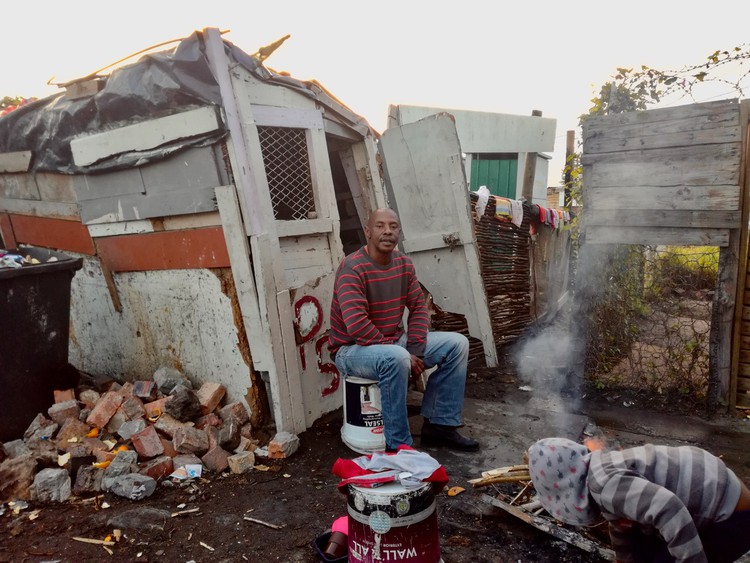Resident welcomes her informal settlement neighbours
Few people have heard of Victoria Lodge – home to about 26 families
Southfield is one of Cape Town’s middle-class southern suburbs. Most residents pay little attention to the small informal settlement situated just off the M5 highway – Victoria Lodge.
But Donna Oakes says that after spending some time with the people of this “forgotten” informal settlement, she decided to get involved. Initially, however, Oakes had to overcome her prejudice. She first approached the residents just over a year ago after there was a robbery at her house.
“My assumption at the time was that the people who live here [Victoria Lodge] are poor so they must’ve stolen something. I started talking to them and saw the conditions they were living in. They were far from criminals,” she said.
Victoria Lodge consists of several small shacks. There are about 31 adults and 23 children.
Seated around a fire, Marieka and John Geld told GroundUp that they were among the more recent occupiers, although they have already been in the informal settlement for 12 years.
A man who introduced himself as the settlement’s janitor, Kaya Fontier, said he moved from Oudtshoorn and at first slept in the bushes.
“Every morning a few of us would clear rubbish and bushes from the land. We slept under a large plastic sheeting at night and packed it up again in the morning. After a while, a Father Tim from St Martin’s Church in Southfield donated the hokkies [shacks] and bought planks for us to build,” he said.
Kobus Killian, who does piecemeal work, has lived in Victoria Lodge for 25 years. He has six children, aged between 12 and two. Four of them live with him.
“Most people who live here are unemployed and about six or seven do odd jobs … Many of the women here depend on [social grants],” he said. “Many of the children don’t even have birth certificates.”
Resident Christine Simon said her small shack often floods in the rain. “It gets very cold and wet here in winter, but I’m happy just to have a covering over my head,” she said. Her health is poor.
Simon said her husband was the only breadwinner and as a result they relied largely on donations from people like Oakes. “We’re very grateful for Donna who brings food and clothes and my children don’t go hungry.”
Oakes said she has recently seen an increase in the number of people at the informal settlement on the days she brings food parcels. She said: “It’s strange when new people are here, because most people only come here around Christmas time to bring food and clothes. The rest of the year they are basically forgotten.”
After six months of funding her own soup kitchen for the families of Victoria Lodge, Oakes started a Facebook page, urging friends and family to assist with donations.
“Recent responses by people have been great. I have a few people who donate money regularly, so we can bring food three times a week,” she says.
She calls her organisation “Alms of Love – One Give at a Time”.
Ward councillor Kevin Southgate said the land was owned by the provincial government. Southgate said the City has provided residents with toilets, taps, metered electricity boxes and regular refuse removal.
Letters
Dear Editor
To me it does not make sense that the City of Cape Town spends money on supplying toilets to people in informal settlements. These toilets are costing the City tens of thousands of rand every month. These people need houses, not toilets. I am unemployed but am fortunate enough to have a roof over my head.
I would like to help with some food parcels to ease the suffering of these human beings living in unacceptable and inhumane living conditions but am not sure how?
© 2017 GroundUp. 
This article is licensed under a Creative Commons Attribution-NoDerivatives 4.0 International License.
You may republish this article, so long as you credit the authors and GroundUp, and do not change the text. Please include a link back to the original article.



